
Honorary citizen of Novi Sad is a title awarded by the leadership of Novi Sad on behalf of the city.

Honorary citizen of Novi Sad is a title awarded by the leadership of Novi Sad on behalf of the city.
The title can be awarded to both a citizen of Serbia and any other state, as a politician or statesman, as well as a representative of a non-governmental organization or an artist. A candidate for honorary citizenship of Novi Sad must have a contribution to the development of science, art, humanitarian activities, etc., which has helped the development and image of Novi Sad, the development of democracy in Serbia and the world. The decision to award the title is made by the City Assembly. [1] [2] [3]
A person who has received the title of honorary citizen of Novi Sad is presented with an official letter on official paper at an official meeting of the Assembly. An honorary citizen is given the city symbol in the form of a gilded key with the emblem of Novi Sad. [3]
The first honorary citizen of Novi Sad was Nikola Tesla by the decision of the Assembly of the city on 10 July 1936. He was awarded this title due to the 80th anniversary of his birth, his worldwide contributions in the fields of physics and engineering, and bringing glory to the Serbian people and the people of the Kingdom of Yugoslavia. After World War II, the second honorary citizen was Josip Vidmar in 1970. [3]
On 16 October 1992 (the year when the title was officially established), the Assembly of Novi Sad made the decision where the title of honorary citizen is given to any prominent figures from the country and abroad who, through their work in establishing and developing co-operation with Novi Sad, have made a significant contribution to the city's interests and needs. [3]
Since its existence, most people given the title of honorary citizen are humanitarians.
The list includes people who have been awarded the title of honorary citizen of Novi Sad.
| No. | Name | Portrait | Date | Notes | Country | Ref(s) |
|---|---|---|---|---|---|---|
| 1 | Nikola Tesla (1856—1943) |  | 10 July 1936 | Serbian-American inventor, electrical engineer, mechanical engineer, and futurist. For the 80th anniversary of his birth, his worldwide contributions in the fields of physics and engineering, and bringing glory to the Serbian people and the people of the Kingdom of Yugoslavia. | [1] [2] [3] | |
| 2 | Josip Vidmar (1895–1992) |  | 1970 | Slovenian literary critic, essayist, and politician. For his creative work in the fields of literature and art, for activity and participation in the public and political life of socialist Yugoslavia, and for his 15 years of valuable work and contribution for the growth of Sterijino pozorje of Serbian National Theater. | [1] [2] [3] | |
| 3 | Vyacheslav Klykov (1939—2006) |  | 1992 | Russian sculptor of public monuments. For his contribution to the promotion and enrichment of the co-operation between the Russian and Serbian peoples, and for his gift to Novi Sad and the Serbian people of the statue of Saint Sergius of Radonezh in Danube Park. | [1] [2] [3] | |
| 4 | Monica Seles (1973—) |  | 1993 | Hungarian tennis player and former world No. 1 from Novi Sad. For her contribution to the affirmation, popularization and spreading the knowledge about Yugoslavia and Novi Sad abroad. | [1] [2] [3] | |
| 5 | Peter Beckley |  | British humanitarian and founder of the Norfolk and Norwich Novi Sad Association. For his contribution to the development, improvement and enriching of all forms of co-operation between Norwich and Novi Sad. | [1] [2] [3] | ||
| 6 | Diana Beckley |  | British humanitarian and founder of the Norfolk and Norwich Novi Sad Association. For her contribution to the development, improvement and enriching of all forms of co-operation between Norwich and Novi Sad. | [1] [2] [3] | ||
| 7 | Alberto Salvato |  | 1994 | Italian humanitarian. For his devotion and selfless engagement in collecting humanitarian aid throughout Italy for children who have lost one or both parents in the Yugoslav wars. | [1] [2] [3] | |
| 8 | Hannelore Lamché |  | 1999 | German humanitarian. For her selfless commitment to the mission and delivery of humanitarian aid to children and young people with mental and physical disabilities, as well as for strengthening the reputation of the city of Novi Sad in its partner city of Dortmund and throughout the Federal Republic of Germany. | [1] [2] [3] [4] | |
| 9 | Mikis Theodorakis (1925—2021) |  | 1 February 2004 | Greek composer and lyricist. For his great friendship, love and appreciation towards Novi Sad and its people by the wonderful music of the ballet "Grk Zorba" with which he contributed to the affirmation of Novi Sad as a city of culture. | [1] [2] [3] | |
| 10 | Siniša Mihajlović (1969—2022) | 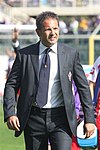 | 2006 | Serbian professional football manager and former footballer. For bringing glory to Novi Sad and Serbia for his contributions in international sports and for his humanitarian aid towards children and young people who have lost one or both parents in the Yugoslav wars. | [1] [2] [3] | |
| 11 | Vladimir Putin (1952—) |  | 25 January 2008 | Russian politician and the President of Russia. For his huge contribution in preserving the sovereignty and territorial integrity of the Republic of Serbia and strengthening its international political position during trying times. | [1] [2] [3] [5] | |
| 12 | Efraim Zuroff (1948—) |  | 22 January 2009 | American-born Israeli historian, Nazi hunter and director of the "Simon Wiesenthal" Center. For his fight for justice for all the victims of the fascist terror and his immeasurable contribution in bringing justice for the victims of the fascist Raid in Novi Sad. | [1] [2] [3] [6] | |
| 13 | Jean-Pierre Lotz |  | 2016 | French doctor and professor. For his long-standing commitment to the training of Novi Sad's oncology doctors, his contribution to the application of autologous peripheral stem cell transplantation, for exams and consultations carried out on a gratuitous basis, for drug donations and for the consolidation of the most modern medical instruments of the city of Novi Sad. | [1] [2] [3] |
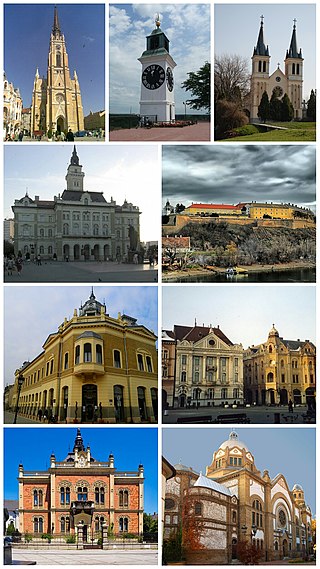
Novi Sad is the second largest city in Serbia after the capital Belgrade and the capital of the autonomous province of Vojvodina. It is located in the southern portion of the Pannonian Plain on the border of the Bačka and Syrmia geographical regions. Lying on the banks of the Danube river, the city faces the northern slopes of Fruška Gora.

Liman is an urban neighborhood of the city of Novi Sad, Serbia. It is located to the south of the city centre, along the Danube river, covering an area of 3.98 km2. It is a relatively new part of the city, built between 1960s and 1990s on what previously were marshes. It is divided into four parts, numbered by Roman numerals: Liman I, II, III and IV, which match the chronology of its development.

Liberty Bridge is a cable-stayed bridge on the Danube river in Novi Sad, Vojvodina, Serbia. The bridge was opened for traffic on 23 October 1981. During that time, the bridge was the world record holder in the category of bridges with cable-stayed design. It was destroyed during NATO bombardment on 3 April 1999. It was rebuilt from 2003 to 2005 and reopened on 7 October 2005.

Bistrica, also known as Novo Naselje, is an urban neighborhood of the city of Novi Sad, Serbia. Bistrica is one of the most populated urban areas of the city.

Telep is an urban neighborhood of the city of Novi Sad, Serbia.

Novi Sad is the capital of the Serbian province of Vojvodina, and second largest city in Serbia.
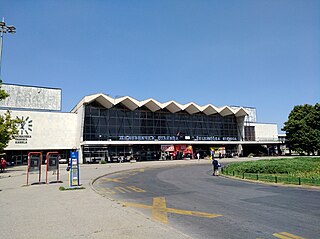
Novi Sad railway station is the main railroad station in Novi Sad, Serbia. The current station, located at Jaše Tomića Boulevard, was opened in 1964, after closing the old railway station from 1883 previously located at what is today the Liman fresh market. The station serves two daily high-speed trains to Belgrade and is part of the Budapest–Belgrade railway project.

Miloš Vučević is a Serbian lawyer and politician serving as deputy prime minister of Serbia and minister of defence since 2022 and as president of the Serbian Progressive Party (SNS) since 2023. He previously served as mayor of Novi Sad from 2012 to 2022.
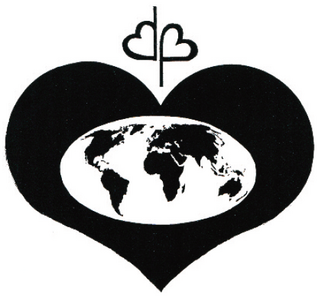
The Correspondence Theatre is a specific type of theatrical organization and play, established in Novi Sad in 1973. This idea was theoretically and practically implemented by Mladen Dražetin from Novi Sad. It was the original model for the spread of theatrical culture among the broad masses.
Nada Lazić is a Serbian politician. She served in the National Assembly of Serbia from 2014 to 2020 as a member of the League of Social Democrats of Vojvodina.

Žeželj Bridge is a tied-arch bridge on the Danube river in Novi Sad, Vojvodina, Serbia. The bridge was originally built in 1961, and was destroyed during the 1999 NATO bombing of Yugoslavia. The newly constructed bridge was opened in 2018.
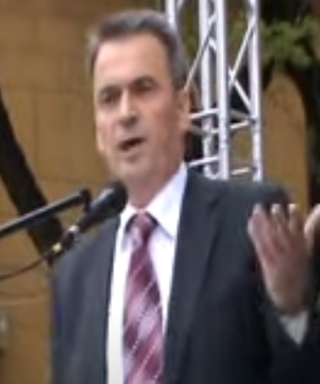
Milorad Mirčić is a Serbian politician. He is a prominent figure in the far-right Serbian Radical Party and has served several terms as an elected official at the local, provincial, and republic levels. Mirčić was the mayor of Novi Sad from 1993 to 1994 and was minister of the Serb diaspora in the Serbian government from 1998 to 2000. He is now a member of the Novi Sad city assembly.

Dragana Milošević is a politician and musician in Serbia. She has served in the government of Vojvodina since 2018 as secretary for culture, public information, and relations with religious communities.
Ružica Igić is an academic and politician in Serbia. She was a member of the National Assembly of Serbia from 2012 to 2014 and has served in the Assembly of Vojvodina since 2020. Igić is a member of the Democratic Party of Serbia.
Dragan Milošević is a doctor, politician, and administrator in Serbia. He served in the Assembly of Vojvodina from 2000 to 2004 and has been a member of the Novi Sad city assembly. During his time as an elected official, Milošević was a member of the Democratic Party.

Milan Đurić is a Serbian politician and lawyer serving as the mayor of Novi Sad since 26 October 2022. A member of the Serbian Progressive Party (SNS), Đurić was the deputy mayor from 2020 to 2022.